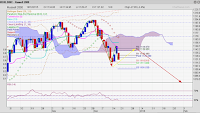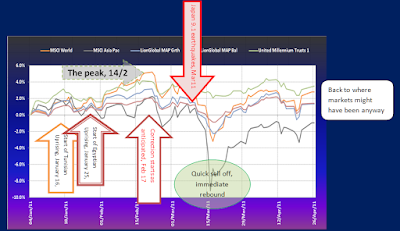Turning Points for September
September 15, 2016
Cycles Stay In Control
The next few weeks are crucial to the truth of this statement:
- We said, gold prices will start to rise as of now.
- I expected stock prices to see a short term peak on the September 15, - TODAY - , and then retreat in big steps, possibly till late in November.
- I expected the USD to start softening, - and interest rates to stay put at least till after the US elections.
Continued divergence in indices globally can be attributed to the dissonance in monetary policies between the US and the rest of the world. But that alone is insufficient as a cause. Central banks can reduce or increase short term interest rates, but the markets decided the real rates in mortgages, yields in bonds, and long term interest rates.
- Gold prices are just about turning up today, from a low of $1317. A slow rise will improve the chances of a lasting change in direction.
- Stock markets have seen major volatility increase, daily moves of 2% and more, criss-crossing direction each trading day, but as yet no real attempt to spike up one last time. This could suggest that the bearish momentum is gaining already. We shall have to wait for next week to confirm this either way, If there is no reprieve then I expect markets to roll down for 8 weeks or so.
- the fate of the USD hinges on whether or not punters believe in an imminent rate increase or whether they go with Mr Bernanke, who says - no normalisation in his lifetime! My bet is and has been on the USD to soften, gradually, so as to hoodwink a few bulls and create a few more red faces later.
Talking Cycles
Every now and then, I talk about what cycles suggest that financial markets will or will not do. The major obstacles to an unbiased, comprehensive report is that most cycle researchers focus on the US and European markets as that is where they find the most data. Without data, - on who sells what for how much and when - cycle researchers are up the creek without a paddle. They could find a lot more synergies, if they tried.
Historical Evidence
Some wiseguys say, "it does not matter, you can ignore the markets in Asia, EMEA..." etc. They point to the times a few years ago when most investment trends hinged on decision makers out of the US. "When America sneezes, Europe comes down with the flu, and the rest of the world catches pneumonia", the professional marketeers used to say. Somehow, the situation has changed, and continues to diverge. It does NOT mean that the US has lost its position as financial market leaders. It just means, it requires more work on the part of the central banks and governments to create global market synchronicity, if they so desire. At the moment, it may not even be desired.
Cycle Magic
Cycles may work their magic without a single cause, event or trigger point, obvious for all to see. For more than a year, I have highlighted repeatedly the lack of correlation between financial markets,. There are a lot more players in the markets, Especially the monetary easing activity as promoted by the central banks of Europe, Japan, China, and a few other countries has created individual country and sector trends that largely depend on the free-flow of money, credits and low or no interest rates. Hence, the "bears" of today point to the same as signs that the economic momentum around the world would be running headlong into a brick wall, if the accommodative stance is curtailed.
In truth, we have seen several examples of markets bolting when the FED, or the ECB hint at "normalising" their interest rate regime/ or as for the ECB, a promise to increase their QE provisions: In May 2014, the first tentative suggestion to increase rates send markets spinning. See also Interest Rate Hike Now - Or When? (12-9-2015); October 18, 2015; December 2015;
It will keep happening as long as investors are convinced that a rise in interest rates spells disaster! How long will that belief last? Fact is that low interest rates is causing a lot of trouble for low risk investors, and businesses like insurance, banks, and pension funds. Suddenly, there are no RISK FREE RETURNS. Risk is omnipresent, even in currencies. Is it reasonable for those businesses to being forced into higher risk positions, when their clients really want low risk/low volatility returns? How long before these business start looking to the individual customer to create an extra revenue stream. It has happened with iFAST / fundsupermart a few years ago, when they introduced platform fees. It's happening with the Deutsche Postbank now, levying account fees for all its customers (almost)! There are plenty more examples if you care to look.
BIG, LONG TERM CYCLES, smaller, medium term cycles
This, living with low rates for a prolonged period, is one big cycle phenomenon we need to analyse very carefully, because waves of repercussions will be generated in every direction, every business and section of society.. For instance, it could lead to a major price war between financial institutions, It is leading to a revolution in the way banking services are provided, which will catch traditional businesses on the wrong foot. Disruptive practices, the buzz words for the new generation of entrepreneurs (well, Richard Branson is not so new, but still a great proponent of it), brings changes, often painful changes, to many industries and with plenty of faux pas to boot. Everyone hopes, it will be for the better. I do, too, but the realities do point to more disruption in the offing as the idea of "added value" as the sole factor to measure for a payment, a salary, and a bonus, has been jaded. I mean, hung out to dry, because revenue is no longer a reflection of it! Not good news for chickens, not good news for added value suppositions either.
But in the short-term, I expect more volatility in just about every asset class: Stocks to fall, bonds to rally, precious metals to rise gradually, and currencies to yoyo, which makes the outlook for commodity prices rather murky. Commodities, - oil and energy in particular - could fluctuate (and create extra risk in the portfolio) but medium term prove a worthwhile investment. I will qualify this statement at a later date.
Good hunting, if you got the gear and guts for it.
But in the short-term, I expect more volatility in just about every asset class: Stocks to fall, bonds to rally, precious metals to rise gradually, and currencies to yoyo, which makes the outlook for commodity prices rather murky. Commodities, - oil and energy in particular - could fluctuate (and create extra risk in the portfolio) but medium term prove a worthwhile investment. I will qualify this statement at a later date.
Good hunting, if you got the gear and guts for it.



Comments